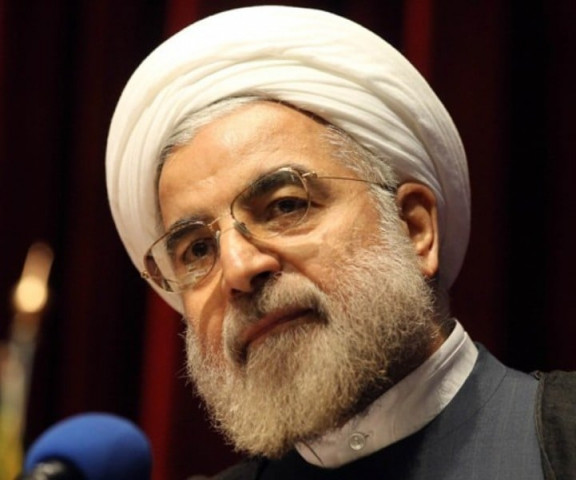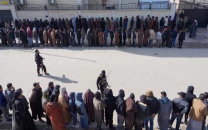Kerry to warn US Senate off new Iran sanctions
Negotiations between Iran and six world powers failed to reach an interim deal to halt its program.

President of Iran Hassan Rowhani. PHOTO: AFP/FILE
Senate Republicans and Democrats who are convinced that tighter sanctions against Tehran could bring about a long-sought resolution to its disputed atomic program bristled when the White House warned Tuesday that such action could trigger a "march to war."
The administration's remarks Tuesday marked a significant toughening of President Barack Obama's stance towards Congress on sanctions as Washington prepares to resume high-stakes nuclear diplomacy with Iran later this month.
Obama has vowed he will not allow Tehran's leaders to develop an atomic weapon. But last week's Geneva negotiations between Iran and six world powers failed to reach an interim deal to halt its program.
Key senators from both US parties, some responding to Israel's savaging of the proposed agreement, are proposing stiffer sanctions or may curtail Obama's power to ease current measures, which have crippled the Iranian economy.
But the White House said any new sanctions could scupper the diplomatic process and leave little option but the use of military force against Iran.
"The American people do not want a march to war," White House spokesman Jay Carney told reporters, saying US citizens "justifiably and understandably prefer a peaceful solution that prevents Iran from obtaining a nuclear weapon."
"This agreement, if it's achieved, has the potential to do that. The alternative is military action," Carney added.
The White House believes in offering Iran some "modest" and "reversible" steps to ease the pain of some sanctions as part of an interim deal to bolster Tehran's negotiators against hardliners who are skeptical of new President Hassan Rouhani's diplomatic opening.
But many US lawmakers believe tightening sanctions will give the administration more leverage -- and doubt Tehran is serious about standing down its nuclear program.
Republican Senator Mark Kirk maintained that sanctions are the best way to avoid war.
"The American people should not be forced to choose between military action and a bad deal that accepts a nuclear Iran," he said.
White House aides, however, privately say that once war-weary Americans understand the alternative to a deal with Iran means another Middle East conflict, they will warm to Obama's approach.
Tehran denies Western claims it is trying to develop a nuclear weapon.
Fresh from the Geneva talks, Kerry will take the administration's position directly to the Senate Banking Committee, which is mulling a new sanctions package.
"The secretary will be clear that putting new sanctions in place would be a mistake," State Department spokeswoman Jen Psaki said.
"What we are asking for right now is a pause, a temporary pause in sanctions," she told reporters. "We are not rolling them back."
Obama spoke Tuesday with British Prime Minister David Cameron about recent proposals in Geneva and "discussed their expectations for the next round of talks," the White House said.
The House of Representatives has already passed a bill hardening Iran sanctions, but the Senate agreed to delay further action to allow diplomacy a chance to succeed.
Kerry is likely to argue for a further delay, to cover the next round of talks, sources said.
But Senate Foreign Relations Committee chairman Robert Menendez sounded taken aback by the White House warning that stiffer sanctions could lead to military confrontation.
"That's pretty alarmist. Over the top," he told AFP.
Republican Senator Richard Shelby said that the White House warnings over the impact of new sanctions were "wrong."
"We don't know how sincere yet the Iranians are in our whole negotiations," he said.
Senator Michael Crapo, the top Republican on the Banking Committee, said he believes the Senate should "move aggressively forward on our sanctions legislation," although he said he was willing to listen to Kerry's arguments.
Republican Senator Pat Toomey told AFP that "really tough sanctions" were the only way to bring Iran to the table "in a meaningful way and get them to agree to end their program."
But Trita Parsi, president of the National Iranian American Council, said new sanctions could seriously limit Rouhani's ability to maintain his "soft position" on the negotiations.
Meanwhile, a House panel will take up the issue Wednesday.
Republican Ed Royce, chairman of the House Foreign Affairs Committee that convenes the hearing, said that should sanctions be weakened "it will be harder to ratchet up the economic pressure on Iran than it will be for the Iranians to ratchet up their nuclear program."



















COMMENTS
Comments are moderated and generally will be posted if they are on-topic and not abusive.
For more information, please see our Comments FAQ